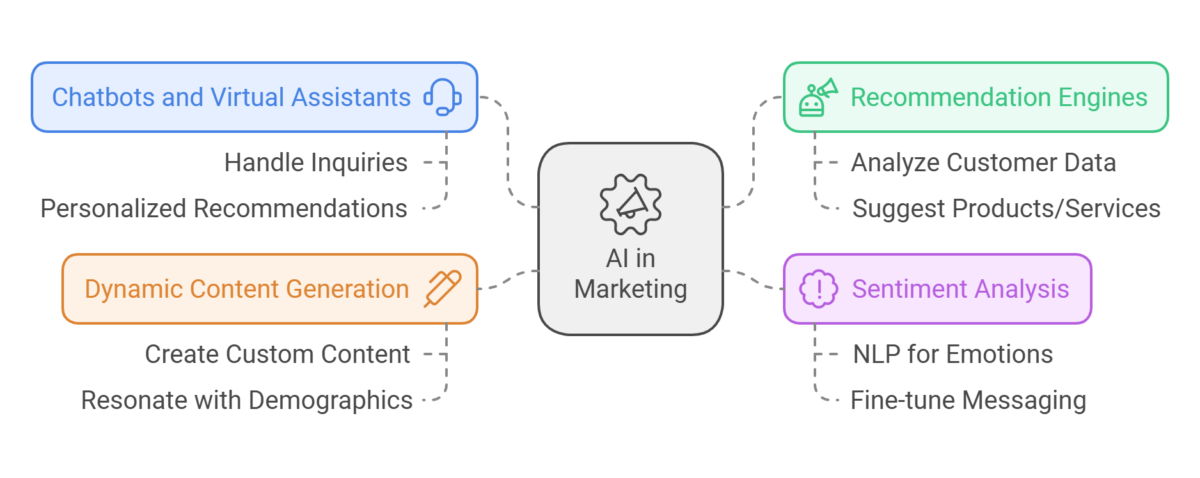In today’s fast-paced digital world, customer engagement is a critical factor in the success of any marketing strategy. Traditional methods of reaching customers no longer suffice in a marketplace saturated with options and noise. Enter artificial intelligence (AI) — a transformative force reshaping how businesses connect with their audience. By enabling real-time personalization, predictive insights, and data-driven decision-making, AI is revolutionizing modern marketing and helping brands foster deeper, more meaningful connections with customers.
What is AI in Marketing?
Artificial intelligence in marketing refers to the use of tools that employ large language models, machine learning algorithms, natural language processing, and data analytics to automate, optimize, and enhance marketing activities. From chatbots that provide instant customer support to advanced recommendation engines on e-commerce platforms, AI is seamlessly integrated into the customer journey.
By analyzing vast datasets, AI tools can identify patterns, predict customer behavior, and recommend actions that resonate with target audiences. This goes beyond simply delivering ads—it’s about creating a two-way dialogue where customers feel seen, understood, and valued.
The Benefits of AI in Customer Engagement
AI offers several compelling advantages for marketers looking to enhance customer engagement:
- Personalization at Scale
AI allows businesses to deliver tailored experiences to millions of customers simultaneously. Whether it’s personalized email campaigns, dynamic website content, or targeted advertisements, AI ensures each customer receives content that aligns with their preferences, behaviors, and purchasing history. - Predictive Analytics
One of AI’s most powerful features is its ability to predict future behavior based on past data. Predictive analytics enables marketers to anticipate customer needs, identify trends, and craft proactive engagement strategies. - Real-Time Interactions
With AI-powered chatbots and virtual assistants, businesses can provide 24/7 customer support and address queries in real time. This not only improves customer satisfaction but also boosts engagement rates by making help accessible anytime, anywhere. - Enhanced Customer Insights
AI tools analyze data from multiple touchpoints—social media, website visits, email interactions, and more—to provide a 360-degree view of the customer. These insights help marketers understand audience preferences, pain points, and motivations.
Key AI Technologies Transforming Customer Engagement
Several AI technologies are driving the evolution of customer engagement strategies:
- Chatbots and Virtual Assistants
AI chatbots are increasingly sophisticated, capable of handling complex customer inquiries and providing personalized recommendations. These tools are essential for businesses that want to engage customers around the clock without increasing overhead costs. - Recommendation Engines
Recommendation engines use AI to analyze customer data and suggest products or services they are likely to find appealing. Platforms like Netflix and Amazon have mastered this approach, setting the standard for personalized recommendations. Sometimes these engines are used for price gaging, other times they are used to bring up ads that better resonate with a specific audience. - Sentiment Analysis
Sentiment analysis uses natural language processing (NLP) to gauge customer emotions from text, social media posts, and reviews. By understanding how customers feel about a brand, marketers can fine-tune their messaging and strategies. Most of this technology can be incorporated in the GPT chatbots very easily, making content and chats adequate to the sentiment of the user. - Content Generation
AI-powered tools can create custom content for different audience segments in seconds. For instance, tools like Persado and Jasper generate email subject lines, articles, social media posts, and ad copy that resonate with specific demographics.

Real-World Examples of AI in Customer Engagement
Artificial intelligence (AI) is transforming customer engagement in modern marketing, enabling brands to connect with audiences in innovative and personalized ways. Several companies have successfully integrated AI into their marketing strategies:
- Coca-Cola’s AI-Generated Holiday Campaigns: In recent years, Coca-Cola has utilized AI to create personalized holiday advertisements. For instance, their “Real Magic” campaign invited fans to combine iconic brand assets with AI technology to craft unique holiday messages. Source: Coca-Cola Company
However, some AI-generated ads have faced criticism for lacking emotional authenticity, highlighting the challenges of balancing technological innovation with genuine human connection. Source: Search Engine Journal
- Sephora’s Virtual Artist: Sephora introduced the Virtual Artist, an AI-powered tool that allows customers to virtually try on makeup products. Developed in partnership with ModiFace, this feature uses facial recognition software to overlay products on user selfies, enhancing the shopping experience by enabling customers to experiment with different looks before purchasing. Source: TechRepublic
- Spotify’s Discover Weekly: Spotify’s “Discover Weekly” playlist leverages AI algorithms to analyze user listening habits and curate personalized playlists. By examining factors such as streaming history and user interactions, Spotify delivers tailored music recommendations, enhancing user engagement and satisfaction. Source: Marketing AI Institute
These examples illustrate how AI can be effectively employed to enhance customer engagement through personalization and innovative user experiences.
Challenges in Implementing AI for Customer Engagement
While the benefits of AI are clear, its adoption is not without challenges:
- Data Privacy Concerns
As AI relies on large datasets to function effectively, businesses must navigate privacy regulations like GDPR and CCPA. Transparency about data collection and usage is essential to maintain customer trust. - Integration with Existing Systems
Incorporating AI into legacy systems can be complex and costly. Businesses need a clear strategy and the right technology partners to ensure seamless integration. - Skill Gaps
Implementing AI requires expertise in data science, machine learning, and analytics. Companies must invest in training, hire skilled professionals or source outside vendors to maximize AI’s potential.
Best Practices for Leveraging AI in Marketing
To successfully use AI for customer engagement, businesses should follow these best practices:
- Start Small
Identify one or two areas where AI can have an immediate impact, such as email personalization or chatbot implementation. Once these initiatives are successful, expand to other areas. - Focus on Data Quality
AI is only as effective as the data it analyzes. Ensure your datasets are accurate, relevant, and up-to-date to maximize the value of AI insights. - Maintain a Human Touch
While AI automates many aspects of marketing, it should complement—not replace—human interaction. Use AI to handle repetitive tasks, freeing up your team to focus on building authentic customer relationships. - Monitor Performance
Continuously measure the impact of AI initiatives using key performance indicators (KPIs) such as customer satisfaction scores, engagement rates, and conversion rates. Use these insights to refine your strategies.
The Future of AI in Customer Engagement
The future of AI in marketing is promising, with advancements in machine learning, voice recognition, and augmented reality paving the way for even more personalized and immersive customer experiences. For instance, AI-powered virtual reality (VR) tools could allow customers to “try before they buy” in a virtual store, further bridging the gap between online and offline shopping.
Moreover, as AI becomes more accessible, small and medium-sized businesses (SMBs) will also be able to harness its power, leveling the playing field in competitive markets. The combination of AI and human creativity will undoubtedly lead to marketing strategies that are both innovative and deeply engaging.
Conclusion
Artificial intelligence is a present-day reality that is transforming customer engagement in marketing. By enabling personalization, predictive analytics, and real-time interactions, AI helps businesses connect with customers on a deeper level. While challenges like data privacy and skill gaps exist, the potential rewards far outweigh the risks.
For businesses ready to embrace the future, now is the time to integrate AI into your marketing strategy. With the right approach, AI doesn’t just enhance customer engagement—it revolutionizes it.

